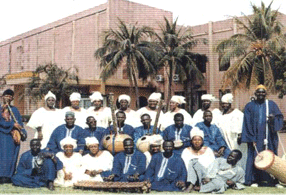
The Music of Mali is, like that of most African nations, ethnically diverse, but one influence predominates; that of the ancient Mali Empire of the Mandinka. Mande people make up 50% of the country's population, other ethnic groups include the Fula (17%), Gur-speakers 12%, Songhai people (6%), Tuareg and Moors (10%) and another 5%, including Europeans. Mali is divided into eight regions; Gao, Kayes, Koulikoro, Mopti, Ségou, Sikasso, Tombouctou and Bamako.

Guinea is a West African nation, composed of several ethnic groups. Among its most widely known musicians is Mory Kanté - 10 Cola Nuts saw major mainstream success in both Guinea and Mali while "Yeke Yeke", a single from Mory Kanté à Paris, was a European success in 1988.

Booker T. Washington "Bukka" White was an American Delta blues guitarist and singer. Bukka is a phonetic spelling of White's first name; he was named after the African-American educator and civil rights activist Booker T. Washington.
Othar "Otha" Turner was one of the last well-known fife players in the vanishing American fife and drum blues tradition. His music was also part of the African-American genre known as Hill country blues.

Corey Harris is an American blues and reggae musician, currently residing in Charlottesville, Virginia. Along with Keb' Mo' and Alvin Youngblood Hart, he raised the flag of acoustic guitar blues in the mid-1990s. He was featured on the 2003 PBS television mini-series, The Blues, in an episode directed by Martin Scorsese.

In the Heart of the Moon is a 2005 record by Malian musicians Ali Farka Touré on the guitar and providing vocals and Toumani Diabaté on the kora. The album was recorded in the "Toit de Bamako" conference room on the top floor of the Hotel Mandé overlooking the Niger River in Bamako, Mali. It is the first in a three-part series released on World Circuit Records entitled "The Hotel Mandé Sessions" followed by Savane and Boulevard de l'Independence. The album's title is derived from Touré's own more lengthy descriptive title for the recording session; "A very important meeting in the realm at the heart of the moon."
The Blues is a 2003 documentary film series produced by Martin Scorsese, dedicated to the history of blues music. In each of the seven episodes, a different director explores a stage in the development of the blues. The series originally aired on PBS in the United States.

Back On Top is an album by blues pianist Pinetop Perkins. It was released in 2000 on Telarc.

Tishoumaren or assouf, internationally known as desert blues, is a style of music from the Sahara region of northern and west Africa. Critics describe the music as a fusion of blues and rock music with Tuareg, Malian or North African music. Various other terms are used to describe it including desert rock, Saharan rock, Takamba, Mali blues, Tuareg rock or simply "guitar music". The style has been pioneered by Tuareg musicians in the Sahara region, particularly in Mali, Niger, Libya, Western Sahara, Algeria, Burkina Faso and others.
Downhome Sophisticate is an album by the American blues musician Corey Harris, released in 2002.

Kulanjan is a 1999 album by blues artist Taj Mahal and Malian kora-player Toumani Diabaté.

Ali Ibrahim "Ali Farka" Touré was a Malian singer and multi-instrumentalist, and one of the African continent's most internationally renowned musicians. His music blends traditional Malian music and its derivative, North American blues and is considered a pioneer of African desert blues. Touré was ranked number 76 on Rolling Stone's list of "The 100 Greatest Guitarists of All Time" and number 37 on Spin magazine's "100 Greatest Guitarists of All Time".
African blues is a genre of popular music, primarily from West Africa. The term may also reference a putative journey undertaken by traditional African music from its homeland to the United States and back. Some scholars and ethnomusicologists have speculated that the origins of the blues can be traced to the musical traditions of Africa, as retained by African-Americans during and after slavery. Even though the blues is a key component of American popular music, its rural, African-American origins are largely undocumented, and its stylistic links with African instrumental traditions are somewhat tenuous. One musical influence that can be traced back to African sources is that of the plantation work songs with their call-and-response format, and more especially the relatively free-form field hollers of the later sharecroppers, which seem to have been directly responsible for the characteristic vocal style of the blues.

Jamal Millner is a guitarist from West Virginia who was a member of the band 5x5 led by Corey Harris.
Shardé Thomas is an American fife player in the vanishing American fife and drum blues tradition. She is the granddaughter of Othar Turner, who founded the Rising Star Fife and Drum Band, and cousin to bandmate Andre Turner Evans. She plays a homemade cane fife.
"Keep Your Lamp(s) Trimmed and Burning" is a traditional gospel blues song. It alludes to the Parable of the Wise and Foolish Virgins, found in the Gospel of Matthew at 25:1-13, and also to a verse in the Gospel of Luke, at 12:35.

Songhoy Blues is a desert blues music group from Timbuktu, Mali. The band was formed in Bamako after being forced to leave their homes during the civil conflict and the imposition of Sharia law. The band released its debut album, Music in Exile, via Transgressive Records on February 23, 2015, while Julian Casablancas' Cult Records partnered with Atlantic Records to release the album in North America in March 2015. The group is one of the principal subjects of the documentary film They Will Have To Kill Us First.











